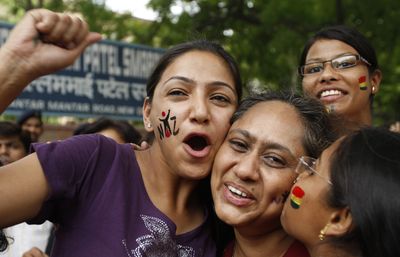New Delhi court rules gay sex is not a crime

NEW DELHI – New Delhi’s gay community celebrated a landmark court ruling Thursday that decriminalizes homosexuality – a decision that could end widespread police harassment and be a harbinger for gradual acceptance for homosexuals across this deeply conservative country.
The Delhi High Court ruled that treating consensual gay sex between adults as a crime is a violation of fundamental rights protected by India’s constitution. The ruling, the first of its kind in India, is not binding outside New Delhi.
Hours after the ruling was issued dozens of members of New Delhi’s gay community – some with rainbows painted on their faces and others holding signs that read “Queer and loving it” – gathered in the heart of the capital to celebrate.
“I’m so excited and I haven’t been able to process the news yet,” said Anjali Gopalan, the executive director of the Naz Foundation (India) Trust, the sexual health organization that filed the petition with the court. “We’ve finally entered the 21st century.”
But some religious leaders quickly criticized the ruling. “This Western culture cannot be permitted in our country,” said Maulana Khalid Rashid Farangi Mahali, a leading Muslim cleric.
Sex between people of the same gender has been illegal in India since a British colonial era law was issued in the 1860s classifying it as “against the order of nature.”
While actual criminal prosecutions are few, the law frequently has been used to harass people. The court’s verdict should protect New Delhi’s gay community from criminal charges and police harassment.
The verdict came more than eight years after the New Delhi-based Naz Foundation filed its petition – not unusually long in India’s notoriously clogged court system. The decision can still be challenged in India’s Supreme Court.
While the ruling is not binding in India’s other states, Tripti Tandon, a lawyer for the Naz Foundation, said she hoped it would have a “persuasive” effect on other courts.